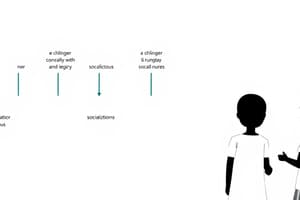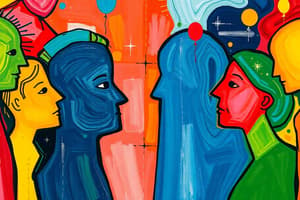Podcast
Questions and Answers
How does the media impact modern identity?
How does the media impact modern identity?
- It shapes identity through the representation of beauty standards. (correct)
- It encourages people to ignore societal ideals.
- It primarily reinforces a sense of collectivism.
- It minimizes the importance of social feedback.
What distinguishes the Western view of the self from the Eastern view?
What distinguishes the Western view of the self from the Eastern view?
- The Western self is seen as independent while the Eastern self is collectivistic. (correct)
- The Eastern view focuses on personal achievement and self-expression.
- The Eastern view prioritizes self-reliance and uniqueness.
- The Western view emphasizes community roles over individualism.
According to Donald Winnicott, what characterizes the True Self?
According to Donald Winnicott, what characterizes the True Self?
- It is primarily shaped by external interactions.
- It is static and unchanging.
- It operates creatively and authentically. (correct)
- It adheres strictly to societal expectations.
How does Confucian thought view the self?
How does Confucian thought view the self?
What does the concept of I-Self and Me-Self illustrate about self-perception?
What does the concept of I-Self and Me-Self illustrate about self-perception?
What is the primary purpose of the socialization process in early childhood?
What is the primary purpose of the socialization process in early childhood?
How do individualistic cultures typically view self-expression compared to collectivistic cultures?
How do individualistic cultures typically view self-expression compared to collectivistic cultures?
In what way do schools contribute to an individual's self-concept?
In what way do schools contribute to an individual's self-concept?
What is the role of religious institutions in shaping an individual's identity?
What is the role of religious institutions in shaping an individual's identity?
What impact does social comparison have on an individual’s self-esteem according to Leon Festinger’s theory?
What impact does social comparison have on an individual’s self-esteem according to Leon Festinger’s theory?
Flashcards are hidden until you start studying
Study Notes
Socialization Process
- Socialization is a lifelong process where individuals learn societal values, norms, and appropriate behaviors.
- Primary Socialization occurs in early childhood within the family, forming a foundational personality and self-image.
- Secondary Socialization takes place later through schools, media, work, and other institutions.
Cultural Values and Norms
- Norms are societal rules of acceptable behavior that individuals conform to for social acceptance.
- Individualistic cultures prioritize autonomy and personal achievement, while collectivistic cultures emphasize community and family harmony.
Language and Symbolism
- Language acts as a cultural tool for developing one's self-concept and shapes thoughts and cultural understanding.
- Symbols such as rituals and customs convey cultural values, impacting identity and acting as markers of belonging.
Social Comparison
- Leon Festinger's theory suggests that individuals assess their abilities and self-worth by comparing themselves to others, influencing self-esteem.
Influence of Different Institutions on the Self
- The Family: First agents of socialization; early emotional support shapes identity and parental expectations guide self-view.
- Educational Institutions: Schools foster intellectual, social, and personal development; hidden curriculum influences a child's worldview.
- Religion: Religious institutions shape moral development and individual identity within a community.
- The Media: Media significantly influences identity through societal ideals and norms, setting standards for behavior and beauty.
- Social Media: Provides platforms for self-presentation and evaluation based on social feedback, affecting self-concept.
- Government and Legal Systems: Laws influence identity formation by promoting specific societal values, citizenship, and responsibilities.
Self-Examination Against Different Views of Self
- Western vs. Eastern Views: Western cultures view the self as independent and unique, emphasizing individualism; Eastern cultures see the self as interconnected, focusing on community roles.
- William James' I-Self and Me-Self: The "I-Self" is dynamic and agentic, while the "Me-Self" is shaped by societal roles and labels; personal self-view may vary between these concepts.
- True Self vs. False Self (Donald Winnicott): The True Self embodies authenticity and creativity, while the False Self is a mask for societal conformity; reflections on personal self-expression matter.
- Multiple vs. Unified Self: Self-perception can vary—some see themselves as having a unified identity across contexts, while others adapt to different social situations.
- Self in Relationships and Spirituality (Confucian Thought): Confucianism posits that identity is defined through relationships, emphasizing moral and spiritual development within family and community contexts.
Studying That Suits You
Use AI to generate personalized quizzes and flashcards to suit your learning preferences.




